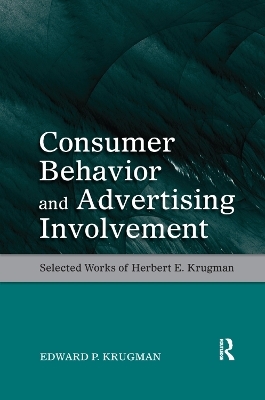
Consumer Behavior and Advertising Involvement
Routledge (Verlag)
978-1-138-38430-9 (ISBN)
From 1967 to his retirement in 1983, Herbert E. Krugman was manager of corporate public opinion research at the General Electric Company. He was previously research vice president for Marplan, for Ted Bates Advertising, and for the indutrial design firm of Raymond Loewy. Dr. Krugman received his Ph.D. from Columbia University in 1952 and his B.S.S. from CCNY in 1942. He is past-president of the American Association for Public Opinion Research, of the Division of Comsumer Psychology of the American Psychological Association, and of the Market Research Council of New York. He has served on the faculties of Yale, Princeton and Columbia Universities and has been a trustee of the Marketing Science Institute in Cambridge, a director of the Advertising Research Foundation and chairman of the Research Policy Committee of the Association of National Advertisers.
Editor’s Note. Foreword by William D. Wells. Part 1. Themes. 1. The Learning of Tastes. 2. The Learning of Consumer Preference. 3. An Application of Learning Theory to TV Copy Testing. 4. Some Applications of Pupil Measurement. 5. A Comparison of Physical and Verbal Responses to Television Commercials. 6. The Impact of Television Advertising: Learning Without Involvement. 7. The Measurement of Advertising Involvement. 8. Psychological Perspectives in Marketing Strategy. 9. Processes Underlying Exposure to Advertising. 10. Television and Trust in Rationality. 11. What’s a Krugman Connection? Part 2. Brain Waves. 12. Flicker Fusion Frequency as a Function of Anxiety Reaction: An Exploratory Study. 13. Passive Learning from Television. 14. Mass Media and Mental Maturity. 15. "Temporary" Effects of Communication. 16. Brain Wave Measures of Media Involvement. 17. Why Three Exposures May Be Enough. 18. What Makes Advertising Effective? 19. Memory Without Recall, Exposure Without Perception. 20. Toward an Ideal TV Pre-Test. 21. The Two Brains: New Evidence on TV Impact. 22. Media Imagery: Perception After Exposure. 23. A Question of Speed of Communications. 24. Sustained Viewing of Television. 25. The Effective Use of Physiological Measurement in Advertising Research. 26. Next Steps - A Productive Approach to Measuring Effective Frequency. 27. The Two Futures of Advertising Research: Images vs. Messages. 28. Beyond Recall. 29. Measuring Memory: An Industry Dilemma. 30. A Personal Retrospective on the Use of Physiological Measures of Advertising Response. Part 3. Corporate Advertising. 31. Adapting Existing Survey Data Banks to Social Indicator Purposes. 32. Innovations in Public Opinion Research. 33. Public Attitudes Toward Private Enterprise and Business. 34. How to Misinterpret Public Opinion Research and Underestimate the Potential of Corporate Advertising. 35. Understanding Public Response to Massive New Technologies. 36. Measuring Progress. 37. Tracking the Effects of Corporate Advertising. 38. Corporate Advertising as "Thought Provoking" Messages. 39. Repetition Revisited: Application of the Three Exposure Theory to Corporate Advertising. 40. Television Program Interest and Commercial Interruption. Part 4. Methods and Observations. 41. The "Draw a Supermarket" Technique. 42. The Role of Magazines in America: Today and Tomorrow. 43. Fast Learning and Slow Forgetting of Advertising Campaigns. 44. Limits of Attention to Advertising. 45. High Resolution Television and Video Games of the Future: Some Psychological Implications. 46. Some Consequences of High Definition Television. 47. Consumer Behavior. 48. Sociology and Consumer Behavior. 49. Pavlov’s Dog and the Future of Consumer Psychology.
| Erscheinungsdatum | 21.01.2019 |
|---|---|
| Reihe/Serie | Marketing and Consumer Psychology Series |
| Verlagsort | London |
| Sprache | englisch |
| Maße | 152 x 229 mm |
| Gewicht | 453 g |
| Themenwelt | Geisteswissenschaften ► Psychologie ► Allgemeine Psychologie |
| Geisteswissenschaften ► Psychologie ► Arbeits- und Organisationspsychologie | |
| Wirtschaft ► Betriebswirtschaft / Management ► Marketing / Vertrieb | |
| Wirtschaft ► Volkswirtschaftslehre | |
| ISBN-10 | 1-138-38430-5 / 1138384305 |
| ISBN-13 | 978-1-138-38430-9 / 9781138384309 |
| Zustand | Neuware |
| Haben Sie eine Frage zum Produkt? |
aus dem Bereich


